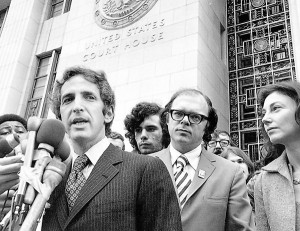 In the nearly 40 years since Daniel Ellsberg released the Pentagon Papers, exposing how the U.S. got involved in the Vietnam War at a time when the country was still deep in the Southeastern Asian morass, he’s found few others who have gone the same route.
In the nearly 40 years since Daniel Ellsberg released the Pentagon Papers, exposing how the U.S. got involved in the Vietnam War at a time when the country was still deep in the Southeastern Asian morass, he’s found few others who have gone the same route.
Not many people have been sufficiently inspired by his actions, which have been called courageous by some and treasonous by others, such as Richard Nixon.
In fact, Nixon almost became obsessed with Ellsberg, according to the White House tapes used in the eye-opening film on the incident “The Most Dangerous Man: Daniel Ellsberg and the Pentagon Papers,” that premieres Tuesday on PBS’ “POV.”
Breaking into Ellsberg’s psychiatrists’ office as an attempt to smear the man who exposed the government lies on Vietnam was part of what led to the impeachment process that led to Nixon’s resignation.
And yet, Ellsberg said earlier this year, at a session to discuss the film by Judith Erlich and Rick Goldsmith, “What puzzles me is that no one has done anything close to it.”
This despite the proven ability of leaks to bring truth to people for whom the government is supposed to be acting.
“I think it makes an enormous difference if people are willing … to put out documents in a way that will show, especially in a more timely way than I did, about an oncoming war where the government is lying to the people. And I have tried to encourage people to consider doing that for years, for many years.”
And until WikiLeak’s storm of downloaded videos and documents this year that didn’t happen. Even when so many knew about the warrantless wiretaps the government was using for years after 9/11.
“Probably a thousand people understood that those wiretaps were illegal,” Ellsberg says. “But they didn’t reveal it. I don’t know why no one does that.”
It could be out of fear of prosecution that grew out of the Ellsberg case, where the government threatened him with 115 years in prison.
“The government tried to make an example of me. I was the first person ever prosecuted for leaking. There’s only been one since. So the risks of prosecution are not what people think.”
Even without prison, leaking sensitive documents can cause loss of a job, friendships, and even a marriage, because of the stress, he says.
“It’s understandable, in other words, as I say, that you don’t have flocks of people doing this. But nobody? I don’t understand that, and I’ve been trying to research that ever since, what’s going on there.”
That changed in recent months as WikiLeaks released thousands of documents and some damning videos on its internet sites, some of which was picked up by the mainstream media.
When a 22-year-old U.S. Army intelligence analyst was arrested in connections with the leaks, Ellsberg said, “If he has done what he is alleged to have done, I congratulate him.”
Ellsberg told the Daily Beast. “He has used his opportunities very well. He has upheld his oath of office to support the Constitution. It so happens that enlisted men also take an oath to obey the orders of superiors. Officers don’t make that oath, only to the Constitution. But sometimes the oath to the Constitution and oath to superiors are in conflict.”
Would the mainstream media today be as interested if the 7,000 page documents on the current wars were released as they were for the Pentagon Papers in 1971?
Eventually, Ellsberg says.
However, it took the New York Times a year to report on information they had on illegal wiretaps because the White House asked they not print it. “They held on to it past the election of 2004, which was, you remember, a very, very close election and could very well have been changed by the revelation that the President had been blatantly lying when he said he was not conducting warrantless wiretaps and had been breaking the law for three years at that point. So I think the Times can be actually challenged with having given us with four more years of George W. Bush.
On the other hand, they did release the news a year later after the election, in 2005, and got a Pulitzer Prize for it, which they deserved, having put it out eventually.”
Their motive may have been to save face. “Their reporter, James Risen, was about to release a book that would reveal, in effect, that the Times had been holding on to that for a whole year. So they did put it out.”
The story of how a country goes to war is very important to know for the people under whose name the war wages.
That’s what makes “The Most Dangerous Man in America” an important story for audiences today, according to the executive producer of POV.
Simon Kilmurry calls he film by Judith Erlich and Rick Goldsmith “indispensable, not only for those who remember the Pentagon Papers and their effect and the effect their publication had in 1971 on the course of the Vietnam War, but it’s equally important for a new generation whose first experiences of U.S. wars fought abroad are the conflicts in Iraq and Afghanistan.”
“The Most Dangerous Man in America: Daniel Ellsberg and the Pentagon Papers” runs on “POV” Tuesday at 9 p.m. on PBS.